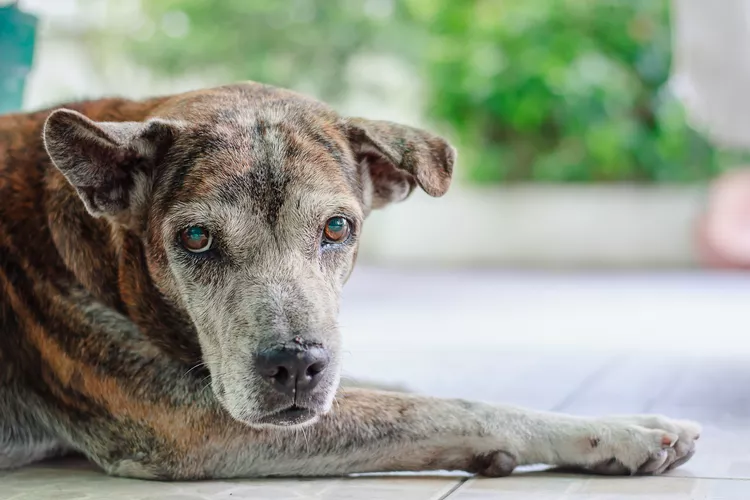How to Identify and Treat Incontinence in Senior Dogs

Older dogs of both sexes can struggle with incontinence, which is the inability to control the elimination of urine and/or stool. Common causes of incontinence in senior dogs include urinary tract infections, kidney disease, arthritis, and dementia.
Supplements and medications can help treat incontinence in dogs, though if there is a root health issue causing it you can certainly treat that. Learn the causes of incontinence in older dogs and strategies for dealing with it.
What Is Incontinence?
Incontinence is the inability to fully control the bladder and/or bowels. A dog that looks at you and squats to eliminate is probably not incontinent. When a dog is truly incontinent, urination and/or defecation can happen without the dog realizing it until it's too late. This can make the dog feel shame and even worry about being disciplined. True incontinence is not your dog's fault. Common findings in incontinent dogs include:
- Leaking urine while sleeping
- Having a bowel movement while sleeping
- Dribbling urine while standing or walking (not squatting first)
- Dropping stool while standing or walking (not posturing to defecate)
- Finding wet spots on bedding
- Smelling urine and/or feces on your dog
In the early stages of incontinence, it may just seem like your dog cannot hold it. It's a good idea to start letting your older dog out to go potty more often than usual.
Diagnosing Incontinence in Dogs
If your older dog begins to have accidents in the house, try first to determine the cause. Is your dog knowingly peeing or pooping in the house? This could be related to a medical condition or a behavior problem.
Causes
The first thing to rule out is a health issue. Contact your vet for a checkup. Senior dogs should see the vet more often than younger dogs; twice per year exams are often recommended. Your vet will probably want to test your dog's urine and blood.
Urinary Tract Infections
The most common health-related cause of urinary accidents is a urinary tract infection. If this is the cause, your vet will put your dog on antibiotics. Urinary issues can also result from bladder stones or tumors. These might require surgery.
Kidney Disease
Urinary tract infections and other urinary issues may be related to kidney disease, especially in older dogs. Kidney disease causes the body to drink more water and urinate more. All of this can be difficult for a senior dog to handle, causing inappropriate urination.
Gastrointestinal Disorders
GI problems can cause diarrhea and other stool issues that can look like incontinence. If your dog's stools seem abnormal, your vet might want to do X-rays or an ultrasound to look at the abdomen.
Spinal Problems
Problems with the spine can lead to nerve issues that cause incontinence. Dogs with intervertebral disc disease or traumatic spinal injuries can develop incontinence. Medical or surgical treatment may not fix the problem if the nerve damage is bad enough.
Arthritis
Arthritis is a common problem in older dogs that affects mobility. Your dog may be stiff and achy, making it difficult for him to get in the right position to urinate and/or defecate. He might be holding it because of this. Then, when he can't hold it any longer, he has an accident.
Brain Disease
Problems in the brain can affect a dog's ability to control his bladder and/or bowels. This may be a brain tumor or infection that has damaged a part of the brain. Or, more commonly, it may be dementia. Also called canine cognitive dysfunction or senility, dementia causes a dog to lose his memory, have trouble concentrating or focusing, and experience personality changes. Dogs with dementia often become anxious and act disoriented. One of the earlier signs of dementia is "forgetting" training, such as house training.
There is no cure for dementia, but there are ways you can help your dog cope. There are also some medications and supplements that can ease symptoms and slow the progression of the disease.
Treatment
Some dogs will benefit from medications and supplements for urinary incontinence. However, incontinence due to dementia cannot be treated the same way. If your dog is incontinent and there is no treatment to stop it, you can make some adjustments to improve your dog's quality of life and preserve your sanity.
- Increase the frequency of walks and potty breaks. Take your dog out immediately after eating, drinking, and waking up. It's similar to how you treat a puppy.
- Put waterproof covers on dog beds and other places where your dog sleeps.
- Use a urine detector to find soiled areas, then clean them with an enzymatic cleaner to keep your dog from being attracted to that area for elimination in the future.
- Place puppy pads in easy-to-access areas so your dog can get relief faster.
- Use doggie diapers for severe cases. Just be sure to change them frequently to avoid skin irritation and infections.
- Bath your dog's genital area often to prevent odor, irritation, and infections. You also may want to keep longer hair trimmed short in the genital area to make cleaning up easier.
It can be hard to deal with these issues as your dog ages, but your dog deserves to live out his golden years as comfortably as possible.